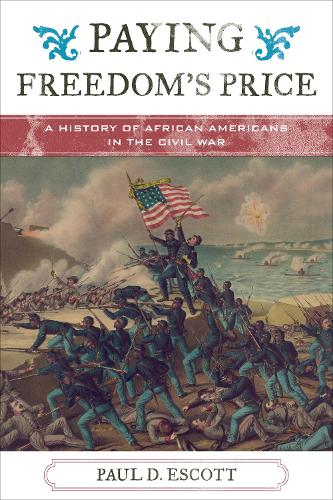
Paying Freedom's Price: A History of African Americans in the Civil War
(Paperback)
Available Formats
Publishing Details
Paying Freedom's Price: A History of African Americans in the Civil War
By (Author) Paul David Escott
Series edited by Jacqueline M. Moore
Series edited by Nina Mjagkij
Bloomsbury Publishing PLC
Rowman & Littlefield Publishers
30th October 2017
United States
Classifications
General
Non Fiction
Early modern warfare (including gunpowder warfare)
History of the Americas
Ethnic studies / Ethnicity
973.7415
Physical Properties
Paperback
182
Width 152mm, Height 228mm, Spine 14mm
272g
Description
Paying Freedom's Price provides a comprehensive yet brief and readable history of the role of African Americansboth slave and freefrom the decade leading up to the Civil War until its immediate aftermath. Rather than focusing on black military service, the white-led abolitionist movement, or Lincolns emergence as the great emancipator, Escott concentrates on the black military and civilian experience in the North as well as the South. He argues that African Americansslaves, free Blacks, civilians, soldiers, men, and women played a crucial role in transforming the sectional conflict into a war for black freedom. The book is organized chronologically as well as thematically. The chronological organization will help readers understand how the Civil War evolved from a war to preserve the Union to a war that sought to abolish slavery, but not racial inequality. Within this chronological framework, Escott provides a thematic structure, tracing the causes of the war and African American efforts to include abolition, black military service, and racial equality in the wartime agenda. Including a timeline, selected primary sources, and an extensive bibliographic essay, Escotts book will be provide a superb starting point for students and general readers who want to explore in greater depth this important aspect of the Civil War and African American history.
Reviews
Civil War expert Escott, professor of history at Wake Forest University, serves up a slender slice of African-American history that will whet the appetite of readers looking for an introduction to the topic. The books content, structure, and simple prose make clear that students are its intended audience. Escotts argument about the agency of African-Americans in securing their freedom during the war isnt new, but remains important. Despite any personal relationships enslaved people may have forged with slave owners, Escott states unambiguously that 'slaves hated their bondage and the coercion on which it was based.' Escott challenges persistent and unfounded assertions that enslaved African-Americans in the South willingly fought for the Confederacy. He goes on to explain why free African-Americans in the North supported the Union war effort. Escotts discussion of black civil rights leadership is particularly illuminating and includes a fascinating discussion of the importance of education. The concluding chapter about the failure of Reconstruction is a sobering reminder of how deeply entrenched systemic racism is in the U.S. [T]heres value in a good historical synthesis. * Publishers Weekly *
In 1860, the black population of the U.S. numbered about 4 million enslaved people in the South and about 225,000 free people in the North. Civil War expert Escott examines the ripple effects of people fleeing slavery during the war wherever they could reach Union armies. His account of the responses of generals to freedom seekers along with policy decisions by Congress and President Lincoln reflects the ways the North gradually adopted the destruction of slavery as a prerequisite to victory. Escott also illuminates the actions of African Americans, collectively in resistance on plantations as well as by migration and by enlistment as soldiers; parses the impact of the advocacy of black leaders, such as Frederick Douglass and John Rock; and considers how African Americans hard-won freedom was circumscribed by discrimination and reversals of progress, such as President Andrew Johnsons revocation of General William Shermans redistribution of land to freed blacks. With a section of relevant documents, Escotts history provides an accessible and informative introduction to the complexity of the American black experience during the Civil War. * Booklist *
Paul Escotts Paying Freedoms Price sketches the powerful history of Americas men and women of color from the outbreak of the Civil War in 1861 to the ratification of the Thirteenth Amendment in 1865. His concise, lucid, and richly analytical narrative chronicles the progress and pathos of African Americans journey from slavery to freedom. Escott supplements his insightful text by reproducing several core documents that underscore the complexity of the emancipation process. Instructors at all levels will find Paying Freedoms Price an invaluable teaching tool, one that highlights how true freedom for persons of color proved elusive in 1865 and remains Americas foremost national challenge today. -- John David Smith, author of Lincoln and the U.S. Colored Troops and We Ask Only for Even-Handed Justice
Paul Escotts seminal work, Paying Freedom's Price, captures the role that African American people played in fighting for their own freedom and northern victory during the Civil WarThe scholarship that results from Escotts work will be insightful. -- Donna J. Benson, Professor of History, Winston-Salem State University
"Paying Freedoms Price: A History of African Americans in the Civil War provides a powerful portrait of the multiple ways in which African Americans in both the north and the south were intimately knowledgeable about and actively engaged in the Civil War. The war, Paul Escott so eloquently demonstrates, was not simply a battle between the Confederacy and the Union or the North and South. It was the ultimate contest between enslavement and emancipation and inequality and citizenship." -- Wanda A. Hendricks, Author of Fannie Barrier Williams: Crossing The Borders Of Region And Race
Author Bio
Paul David Escott is the Reynolds Professor of History at Wake Forest University. He has authored over a dozen books on Southern and Civil War history. Most recently, he has published Lincolns Dilemma: Blair, Sumner, and the Republican Struggle over Racism and Equality in the Civil War Era (2014); Uncommonly Savage: Civil War and Remembrance in Spain and the United States (2014); and The Confederacy: The Slaveholders Failed Venture (2011).
